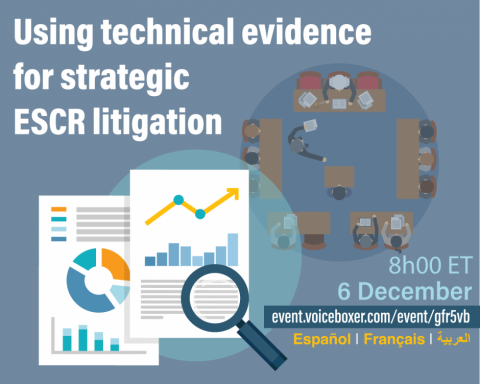
Webinar on Using technical evidence for strategic ESCR litigation
Webinar on Using technical evidence for strategic ESCR litigation
Date: 6th December 2018
Time: 8 am EST conversion here
Languages: English, Spanish, Arabic and French
--> SIGN UP HERE <--
Webinar aims and speakers:
This webinar will explore some of these challenges and also the opportunities related to the use of complex or technical evidence in strategic ESCR litigation by looking at landmark cases from around the world. It will also explore the relationship between monitoring and litigation, both in regard to the implementation of decisions and to rights in general. In particular:
>> Mihir Mankad will present findings on research by the Center for Economic, Social and Cultural Rights (US) mapping the evidence used in around 100 ESCR cases from different jurisdictions;
>> Valentina Rozo will discuss De Justicia’s experience using litigation to counter deforestation and climate change in Colombia;
>> Julieta Izcurdia will talk about ACIJ’s (Asociación Civil por la Igualdad y la Justicia, Argentina) experience using budget analysis to support arguments around the availability of resources;
>> Ragya Elgerzawy will explain how the Egyptian Initiative for Personal Rights (Egypt) used scientific and photo evidence to hold a cement company liable for violations of environmental and health rights, and to counter narrow interpretations of companies’ liability.
Background:
Many violations of economic and social rights are driven by policy failures that are structural in nature. These problems generate and continue cycles of poverty and deprivation and allow children to go hungry, communities to drink contaminated water, and people to live in unsafe homes without water or electricity.
Litigation is a key tool that can help in holding governments accountable for their obligations relating to economic and social rights. However, protecting these rights through litigation often requires making use of various kinds of evidence that can be complex, voluminous or technical. These ‘non-traditional’ types of evidence are important for formulating key elements of economic and social rights claims, such as the use of maximum available resources, non-retrogression, progressive realization, and non-discrimination and equality. In the coming years, as activists and advocates attempt to tackle global human rights challenges such as inequality and climate change, the role of this kind of evidence may become even more pronounced.
However, making use of these kinds of evidence presents a unique set of challenges. Lawyers may be unfamiliar with such evidence and find it difficult to gather and analyze new information or work in non-legal fields. There are also challenges associated with the admission of this kind of evidence in court proceedings and judges’ responsiveness to it.
